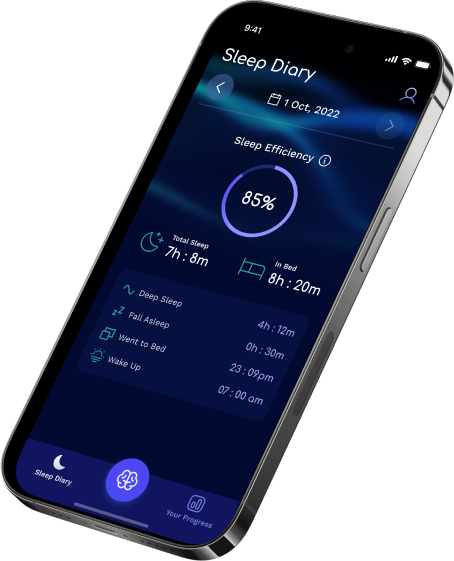
When reading about how to cure insomnia and other sleep disorders, one of the most common recommendations is to“improve your sleep hygiene.”
However, that is an umbrella term. In this article, I will review what the most essential sleep hygiene tips are. The best part is that they are affordable or accessible, and easy to implement.
So, here are 11 sleep hygiene tips for you to sleep better tonight:
1. Set a Sleep Schedule and Be Consistent
It is known that, for most people, having a consistent sleeping schedule — that is, going to bed and waking up at the same time, even on weekends — is a strategy that improves sleep quality and other sleep metrics.
Most of us are already accustomed to having an alarm to wake up in the morning. A less-known tip is setting an alarm to remind us to go to bed. This can be done until going to bed at that time becomes a habit.
Using an app like LucidLink, you can create a sleep schedule as a goal and track how well you can follow it.
2. Sync with the Sun
Syncing with natural daylight is something that most animals do, and it’s also what humans naturally tended to do before the discovery of electricity and modern work practices.
It is true that multiple factors, including genetics, play a role in people’s chronotypes. Some people love waking up in the morning, and some feel energized at night.
For night owls, this can be a complicated issue. Should they abdicate their preferences and simply sync with the sun? We can’t ignore the vast literature on the benefits of sunlight exposure. There’s also a known correlation between these nightly chronotypes and depression and ADHDx. So, I’d say it’s worth at least giving it a chance to see if any positive changes occur.
3. Have a Sleep-Supporting Diet
A proper diet is essential to get a good night’s sleep. That’s because some minerals and vitamins support the production/regulation of hormones and neurotransmitters related to sleep.
Conversely, some foods can disrupt sleep, so they should be avoided.
4. Have a Bedtime Routine
Having a bedtime routine is a way to use some Pavlovian conditioning to signal the body that the time to sleep is approaching.
It should go without saying that this routine should focus on relaxing activities.
Example:
- 9:00: Engage in a soft activity, like reading or listening to music.
- 9:20: Take a warm bath with lavender essential oil.
- 9:45: Practice some gentle stretches or yoga.
- 10:00: Go to bed.
5. Design a Sleeping-Focused Bedroom
Your bedroom should be optimized for sleep, with at least these characteristics:
- Low background noise
- Comfortable temperature
- No lights from the outside, you may need to use blackout curtains.
- No insects flying around
- Nice smell
- Clean and tidy
- Comfortable pillows and mattresses
- Take advantage of other technological solutions like smart thermostats, lights, and more.
Besides these characteristics, you should keep the bedroom as a space dedicated exclusively to sleep, and maybe certain other spousal activities.
6. Use Technology Responsibly
Using technology before bed may not be as bad as people make it out to be.
The bottom line is this: before bed, don’t engage in negative emotionally-disruptive, anxiety-inducing content. Don’t check your work email, don’t post on social media.
Watching funny videos is a good ideax. Listening to music that relaxes is also a good idea. There are many good uses for technology in relation to sleep, you just have to be smart about it.
Q: What about blue light emitted from my phone screen? Does it disrupt my sleep?
Currently, that’s a debatable topic, but from personal experience, my eyes dislike blue light at night, so I like using blue-light-blocking sunglasses if exposed to it. This is not a sleep issue, though. It’s an eye-comfort issue.
7. Try Natural Supplements
There are certain natural herbal supplements like valerian root, lavender, and passionflower that typically can be taken with few or no side effects.
Herbal sleep aids have been used for millennia to lower anxiety and induce sleep. They may not be as strong as prescription drugs, but the upside is that they have fewer or no side effects. And if you take them in conjunction with other sleep hygiene techniques, you can improve their effectiveness.
8. Relaxation Techniques
It’s useless to try falling asleep while feeling anxious and stressed.
There are plenty of ancient but also modern techniques to help you relax, like:
- Slow breathing
- Meditation
- Stretching or Yoga
- Tai Chi
- Therapeutic tremoring
- Rhythmic Skeletal Muscle Tension
- Trigger Point Release (with a Massage, a Lacrosse ball, or a Theracane)
- Soundscapes
- EEG Neurofeedback, as provided by us here at Drowzee Analytics
9. Take a Warm Bath
A warm bath before bed is one of the best ways to sleep better. The warm water relaxes your muscles and reduces tension in your body and mind. You can also try to incorporate this practice as part of your bedtime routine, as suggested in tip 4.
10. Avoid Certain Naps
I should state that naps can be helpful and healthy in certain situations. I even wrote this article defending naps, and arguing that employers should incentivize them among their employees.
However, napping should be done earlier in the afternoon, not exceeding 30 minutes. Otherwise, they will most likely cause trouble falling asleep at night.
11. Exercise
Practicing exercise is a sure way to improve almost everything about yourself. This includes your sleep, of course.
Many options exist, but you should aim for a well-balanced exercise regime that includes muscle-building, high-intensity and medium-intensity cardio*.
*Disclaimer: These are recommendations for the typical healthy individual and may not apply to you, so always consult with your doctor before embarking on this journey.
Conclusion
Sleep hygiene may not even be something that the average person concerns themselves with. And that’s okay if they have a good sleep quality.
But when things are not that easy — and they are not that easy for millions of people worldwide — then it’s important to consider these tips, and start implementing them.
I hope they can help you get a restful night in no time.
Take care and sleep well 💤
MN
🌙 If you enjoy sleep-related content, join our community! Subscribe to our newsletter, follow us on your favorite social media, and join us for a real-time chat on Discord ☀

